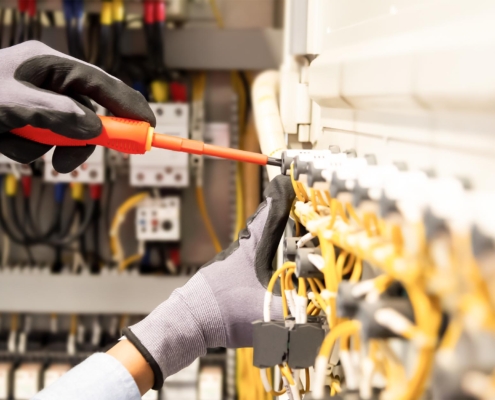 https://www.lwwco.com/wp-content/uploads/2024/02/Electrical-lines-in-rural-area.jpg
1250
2000
Abstrakt Marketing
/wp-content/uploads/2022/10/Lyle-Logo.png
Abstrakt Marketing2024-02-08 10:00:002025-07-01 13:27:33The Top Challenges Facing Rural Electric Cooperatives
https://www.lwwco.com/wp-content/uploads/2024/02/Electrical-lines-in-rural-area.jpg
1250
2000
Abstrakt Marketing
/wp-content/uploads/2022/10/Lyle-Logo.png
Abstrakt Marketing2024-02-08 10:00:002025-07-01 13:27:33The Top Challenges Facing Rural Electric CooperativesUpcoming Electrical Manufacturing Trends
Electrical manufacturing is constantly evolving, with new technologies and methods emerging year after year. Learn more about the top trends that are expected to shape the landscape of industry in the coming years.
Technological Advancements in Electrical Manufacturing We’re Looking Out For
North America has been one of the most important regions when it comes to product development and advancements in the electronics manufacturing industry. The innovation map showcases distinct trends and new technologies shaping the market landscape. Developments in photonic integration, smart manufacturing techniques, and an engineering platform that promotes creativity are vital components of the semiconductor industry’s growth and the evolution of electronic devices. Here are some examples:
Integration of Industrial Internet of Things (IIoT)
One of the most exciting trends seen in electronics manufacturing startups is the increased integration of the industrial internet of things (IIoT) into their processes. IIoT allows manufacturing plants to collect real-time data, helping businesses make informed decisions about their operations. Some examples of applications in the semiconductor industry include predictive maintenance, real-time data analytics, and improved resource utilization.
Robotics and Automation
Another technological advancement showcased in the electronics manufacturing innovation map is the growth of robotics and automation. Electronic device production lines have become increasingly automated, utilizing robots to handle assembly tasks that were previously done by hand. These advancements lead to an increase in efficiency and quality control overall.
Advancements in 3D Printing
3D printing has revolutionized many industries, and electronic device manufacturing is no exception. Semiconductor material applications are being transformed by 3D printing, enabling organic electronics production and support for complex structures that were previously impossible to create. This enhanced manufacturing capability allows for a more rapid iteration of product development, promoting more innovation in the semiconductor industry.
Green and Sustainable Manufacturing
As environmental concerns become increasingly significant, the electronics manufacturing market report points to rising demand for eco-friendly manufacturing practices. Many industry players are now adopting renewable energy sources and implementing waste management solutions like efficient lighting systems, smart HVAC systems, and materials that reduce energy consumption during production processes throughout the semiconductor industry.
As a manufacturer, it can be difficult to develop a marketing and expansion plan. Working with a manufacturer representative like Lyle Williams Company can provide you with the resources you need to reach distributors.
How Workforce Development and Training Will Impact the Electrical Industrial Supply
As the electronics manufacturing industry continues to evolve, the demand for skilled professionals is steadily increasing. This makes workforce development and training imperative for sustainable growth.
Addressing Skill Gaps in the Electrical Manufacturing Industry
Semiconductor material advancements and power consumption challenges highlight the need for more qualified professionals. Market research points to an increasing demand for employees with specialized skills. To solve this issue, many electronics manufacturing startup solutions will involve implementing robust training programs. These programs should help industry professionals adapt to changes in the market.
Emphasis on Continuous Learning and Development Programs
Electronics manufacturing companies are also expected to invest in continuous learning and development programs. This will ensure that staff remains updated on the innovation map of the industry. Continuous skill upgrading will enable professionals to confidently design, develop, and manufacture electronic devices, contributing to the industry’s upward trajectory.
Globalization and Supply Chain Dynamics
Along with workforce development and other technological advancements, globalization plays a crucial role in the future of electronics manufacturing by transforming supply chain dynamics. Companies leveraging cross-border cooperation can optimize their processes, enabling them to excel in the market.
Nearshoring and Reshoring for Improved Manufacturing Agility
With an increasing focus on supply chain resiliency, electronics manufacturing businesses are exploring nearshoring and reshoring strategies. These measures can lead to reduced lead times and improved agility, enabling them to stay competitive. Electronics manufacturing startups can benefit from nearshoring and reshoring by reducing dependencies on international suppliers. This approach also fosters the development of domestic innovation and skills.
Collaboration for Information Exchange and Innovation
Collaboration among companies in the electronics manufacturing industry can facilitate information exchange and innovation. Sharing best practices, resources, and intellectual capital can lead to more efficient processes and breakthroughs in technology. These efforts can bolster industry professionalism and contribute to the growth of the electronics manufacturing market. Such partnerships pave the way for partnerships with artificial intelligence and organic electronics technology in the future.
Trade Policies and Regulations Impacting Electrical Manufacturing
Trade policies and regulations can significantly impact the electronics manufacturing industry. Companies should stay updated on any changes in the current regulatory landscape and adjust their operations accordingly. This will allow for continued compliance and consistent market performance.
Key Takeaway
To maintain a competitive edge in the electronics manufacturing market, companies should keep track of emerging technology trends. As businesses adapt to new technologies in artificial intelligence, organic electronics, and power consumption management, workforce development and training programs need to evolve in parallel. This will ensure the industry remains future-ready, flexible, and capable of addressing upcoming challenges.
Lyle Williams Company: The Industrial Electrical Supplier for You
As the demand for electronic devices and advanced technology continues to grow, the need for reliable and efficient industrial electrical suppliers becomes increasingly important. Manufacturers, engineers, and organizations seeking dependable partners to support their operations can benefit from partnering with Lyle W. Williams Company. We’re a leading supplier of industrial electrical products and services, offering a comprehensive range of engineered solutions for companies in diverse sectors of the electronics manufacturing industry.
Learn more about how we can support your specific needs and contact us today.
Related Postings
 https://www.lwwco.com/wp-content/uploads/2024/02/Electrical-lines-in-rural-area.jpg
1250
2000
Abstrakt Marketing
/wp-content/uploads/2022/10/Lyle-Logo.png
Abstrakt Marketing2024-02-08 10:00:002025-07-01 13:27:33The Top Challenges Facing Rural Electric Cooperatives
https://www.lwwco.com/wp-content/uploads/2024/02/Electrical-lines-in-rural-area.jpg
1250
2000
Abstrakt Marketing
/wp-content/uploads/2022/10/Lyle-Logo.png
Abstrakt Marketing2024-02-08 10:00:002025-07-01 13:27:33The Top Challenges Facing Rural Electric Cooperatives https://www.lwwco.com/wp-content/uploads/2024/02/Professional-adjusting-cables-in-electrical-box.jpg
1250
2000
Abstrakt Marketing
/wp-content/uploads/2022/10/Lyle-Logo.png
Abstrakt Marketing2024-02-08 09:00:002025-07-01 13:27:33Exploring Cutting-Edge Solutions in Commercial Electrical Contracting
https://www.lwwco.com/wp-content/uploads/2024/02/Professional-adjusting-cables-in-electrical-box.jpg
1250
2000
Abstrakt Marketing
/wp-content/uploads/2022/10/Lyle-Logo.png
Abstrakt Marketing2024-02-08 09:00:002025-07-01 13:27:33Exploring Cutting-Edge Solutions in Commercial Electrical Contracting https://www.lwwco.com/wp-content/uploads/2024/01/Wiremold-Charging-Solutions.jpg
1250
2000
Abstrakt Marketing
/wp-content/uploads/2022/10/Lyle-Logo.png
Abstrakt Marketing2024-01-15 11:53:492025-07-01 13:27:34How to Find Success Through Electrification
https://www.lwwco.com/wp-content/uploads/2024/01/Wiremold-Charging-Solutions.jpg
1250
2000
Abstrakt Marketing
/wp-content/uploads/2022/10/Lyle-Logo.png
Abstrakt Marketing2024-01-15 11:53:492025-07-01 13:27:34How to Find Success Through Electrification 
About Us
Lyle W. Williams Company is an electrical manufacturer representative with over 50 years of experience in the field. We build electrical pathways to elevate our industry partners.
